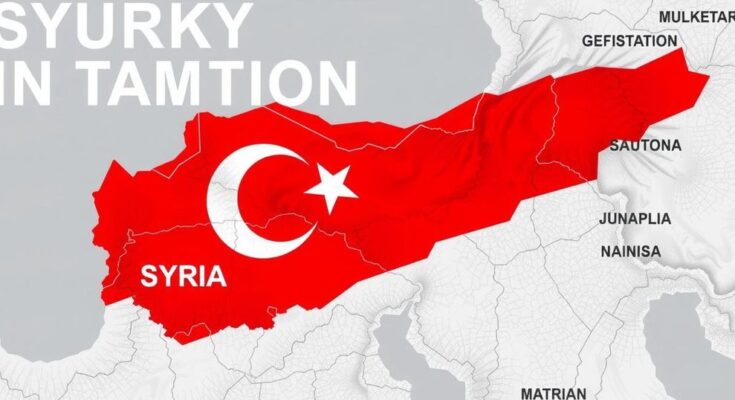Following Assad’s departure, many analysts prematurely celebrated Turkey’s purported victory in Syria. While Turkey has strategic advantages, actual control is complicated by Kurdish resistance and shifting regional allegiances. The relationship with HTS, once seemingly advantageous, has become more complex as HTS seeks to expand its international relationships, challenging Turkey’s influence. The notion of Turkish cultural affinity with Arab states has also proven to be overstated, highlighting the precarious nature of Turkey’s role in Syria’s evolving political terrain.
In the aftermath of Bashar al-Assad’s exit from power, various analysts have prematurely declared Turkey the triumphant nation in Syria’s evolving political landscape. While Turkey has gained some strategic advantages, it is crucial to recognize that a definitive victory has yet to be achieved. Turkey’s support for groups like Hayat Tahrir al-Sham (HTS) and the Syrian National Army has indeed played a role in the regime’s collapse. However, the notion of Ankara’s unchallenged influence in post-Assad Syria is problematic and overlooks significant obstacles.
The apparent collaboration between Turkey and HTS shows a complex relationship where HTS may no longer be dependent on Turkish direction. Concurrently, an influx of international delegations seeking alliances with HTS represents a shift in the balance of power, suggesting that Turkey’s influence may be waning. This is further complicated by the reality that Kurdish groups, particularly the People’s Protection Units (YPG), remain firmly entrenched, continuing to resist Turkish objectives and potentially leading to prolonged conflict.
Moreover, the claims surrounding cultural affinity between Turkey and Arab nations lack substantial evidence, revealing a significant contradiction in Turkey’s strategic assertions. Leaders from neighboring Arab states are actively engaging with Syria’s new leadership, illustrating that Turkey’s historical aims may be overshadowed by regional dynamics and alliances.
Overall, while Turkey possesses critical assets in Syria, the oversimplification of its position as the ultimate victor fails to account for external alliances and the resilience of Kurdish forces. Understanding these complexities is vital for policymakers who must navigate the turbulent waters of Syrian politics with caution, recognizing that Turkey’s path forward is fraught with challenges and uncertainties that render assertions of victory premature.
The narrative surrounding Turkey’s involvement in Syria has gained traction in the aftermath of Assad’s ousting. In this context, various analysts and officials have claimed that Turkey has emerged victorious, capitalizing on the weakened Syrian regime. However, this characterization overlooks the mosaic of regional power dynamics and the nuanced realities affecting Turkey’s role. The ongoing tensions with Kurdish factions, the shifting allegiances of Syrian rebel groups, and the broader geopolitical interests of neighboring states profoundly impact Turkey’s standing in the region. Hence, a thorough analysis is essential to comprehend the unfolding complexities in Syria, especially concerning Turkey’s actual influence and capabilities.
In conclusion, the assertion that Turkey has definitively won in Syria is misguided and overlooks critical factors influencing the post-Assad landscape. Turkey’s current position, while advantageous in certain respects, is fraught with challenges involving Kurdish militancy, regional rivalries, and the evolving relationships with Syrian factions. These elements indicate that Turkey’s ultimate success in shaping Syria’s future remains uncertain and contingent upon broader geopolitical developments. Hence, advocates of Turkish policy must proceed with caution, aligning expectations with the multifaceted realities of the situation.
Original Source: foreignpolicy.com




